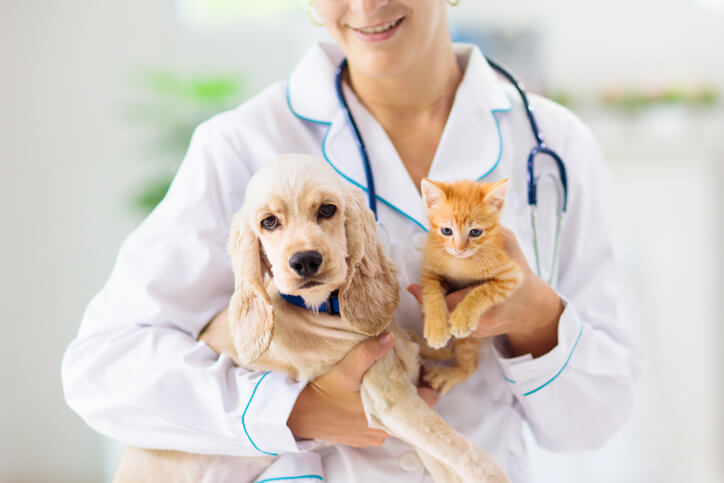You love your pet and want to keep them safe. To do this, it is important to keep household toxins away from them. Your pet investigates the world with their mouths and could ingest toxins around the house accidentally if they are not kept out of reach.
At Animal Medical Center of Streetsboro, we’ve put together a list of the most common household toxins and what you can do to keep your pet safe.
Human Prescription Medications
Common human medications ingested by pets include:
- Antidepressants
- ADHD
- Heart Medications
If they eat medications like this, your pet can suffer severe side effects. Therefore it is crucial to keep your prescription and over-the-counter medications stored safely in a medicine cabinet or a cupboard that your pet can’t access. Be sure to ask visitors to store their medication safely as well.
Over-the-Counter Medications
Medications such as ibuprofen, naproxen, herbal supplements, and cold medications can be toxic to your pet if ingested. It is important to keep in mind that even if the medication does not require a prescription, it can still be very dangerous to administer to your pet.
Nonsteroidal anti-inflammatories like naproxen and ibuprofen can cause your pets to suffer from acute kidney failure. These medications should never be administered to your pets. If your pet is in pain, be sure to first consult with your veterinarian before trying to treat your pet’s medical problems. It is also crucial that you avoid using medication that is not first approved for veterinary use. If your dog ingests a medication such as ibuprofen, time is critical. Immediately take them to a veterinarian to resolve the issue.
Toxic Household Foods
It is likely that your home is full of foods that are delicious for humans but toxic to pets. These foods include:
- Xylitol, found in products like sugar-free gum
- Onions
- Alcohol
- Raw/undercooked meat
- Raw yeast dough
- Grapes
- Raisins
- Macadamia nuts
To prevent pets from ingesting food that is toxic to them, be sure not to leave food out on the counter or in a place they can reach. It is also important to keep pets out of the kitchen while children are eating to keep them from eating food that has fallen on the floor.
Toxic Household Plants
There are certain flowers and indoor plants that can be toxic to pets. Below is a list of some of the plants that can be harmful to pets if ingested:
- Azalea
- Lily of the valley
- Oleander
- Tulips
- Cyclamen
- Daffodils
- Lilies
- Sago palm
If your pet ingests the flowers, stems, or leaves of any of these plants, take your pet and a piece of the plant to your veterinarian immediately.
Toxic Household Items/Chemicals
There are a variety of common household products that are harmful to pets. These include:
- Paint
- Cleaning chemicals
- Glue
- Insecticides like foggers, bug sprays, and ant baits
- Rodenticides
- Insecticides
If your pet ingests any of these harmful chemicals, be sure to take them to the veterinarian immediately.
Have Questions about Toxic Plants or Products? Contact us Today!
Our staff is prepared to answer any questions you may have about medications and other toxic substances, and your pet. If your pet ingests any of the above-mentioned products, contact an emergency vet immediately. Click here for more information.

